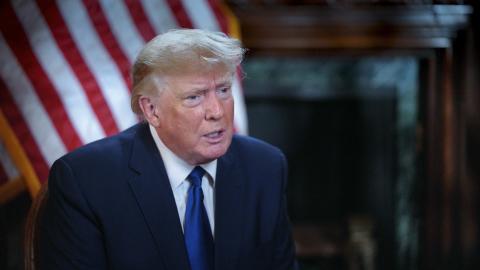
Trump Is Facing a Lot of Legal Limbo Before the Election: What Happens if He's Convicted?
Former President Donald Trump is still the clear GOP frontrunner in the polls as the Republican Party looks to pick its candidate for the 2024 presidential election. But with the four indictments against him this year, legal questions and theories have come up from numerous political groups and pundits about whether he can even run.
While this is certainly uncharted territory for the U.S., several legal scholars say there's nothing in the U.S. Constitution that could prevent the former president from running or being elected even if he was convicted. There are some caveats and unresolved questions, however, like the 14th Amendment.
According to the Constitution, there are three qualifications which one must meet in order to seek the office of President, listed here:
- Must be at least 35 years old;
- Must be a natural-born citizen;
- Must have lived in the U.S. for at least 14 years.
Former President Trump meets all of those requirements. But what if certain states tried to place additional requirements in order for his name to be placed on the ballot?
Eugene Mazo, an election law expert and a professor at Duquesne University told the Voice of America (VOA) that even a candidate with a "mental incapacity" can't be barred from running "because the Constitution lists all the requirements."
If you want an additional requirement, it has to come through a constitutional amendment," he said.
 Mazo also explained to the VOA that in the past, some states passed legislation requiring presidential candidates to provide their tax returns. Those laws were later struck down as unconstitutional. This means that states likely can't try to keep anyone off the ballot, for example, by passing legislation requiring that presidential candidates have no criminal record. However, states can prohibit convicted felons from running for state offices, not federal ones.
Mazo also explained to the VOA that in the past, some states passed legislation requiring presidential candidates to provide their tax returns. Those laws were later struck down as unconstitutional. This means that states likely can't try to keep anyone off the ballot, for example, by passing legislation requiring that presidential candidates have no criminal record. However, states can prohibit convicted felons from running for state offices, not federal ones.
"We let states set the time, place and manner" of elections, Jessica Levinson, a professor at Loyola Law School who specializes in election law told The New York Times. "But I think the best reading of our Constitution is you don't let the state add new substantive requirements."
Indictments, and even potential convictions, do not legally disqualify Trump from running for president in 2024 or from serving if elected, Chris Edelson, an assistant professor at American University told Axios.
If Trump had been convicted by the U.S. Senate during his impeachment trials in 2020 and 2021, it would have disqualified him from holding office. However, the Senate acquitted him in both trials.
What About the 14th Amendment?
The 14th Amendment was passed by the Senate in July of 1868. Section Three of the amendment was written and passed following the Civil War to prevent the former Confederate states from sending senators and representatives who had participated in the Confederate government.
This section of the amendment was drafted to incorporate a constitutional requirement that any who violate their oath to the Constitution are to be barred from public office.
Section Three states:
"No person shall be a Senator or Representative in Congress, or elector of President and Vice President, or hold any office, civil or military, under the United States, or under any state, who, having previously taken an oath, as a member of Congress, or as an officer of the United States, or as a member of any state legislature, or as an executive or judicial officer of any state, to support the Constitution of the United States, shall have engaged in insurrection or rebellion against the same, or given aid or comfort to the enemies thereof. But Congress may by a vote of two-thirds of each House, remove such disability."
Recently, Section Three has become a rallying cry for Democrats, liberal groups, and political pundits who argue Trump incited an insurrection against the U.S. on Jan. 6, 2021, when a large group of his supporters rioted and forced their way into the Capitol building in an effort to stop Congress from certifying Joe Biden's victory in the 2020 election.
Forbes reports that conservative legal scholar J. Michael Luttig and the left-leaning Laurence Tribe support the idea of using the 14th Amendment against Trump.
But as constitutional scholar Jonathan Turley, the Shapiro Professor of Public Interest Law at George Washington University, recently noted in his blog, while some academics have supported this theory, he calls it "a legal urban legend."
"Conservative scholars William Baude and Michael Stokes Paulsen have argued for the interpretation and insist in a recent law review article that 'the case is not even close. All who are committed to the Constitution should take note and say so,'" he recounted.
"But some of us like to believe that we are committed to the Constitution and, for that same reason, we say no," Turley wrote.
"While I have great respect for these academics, I simply fail to see how the text, history or purpose of the 14th Amendment even remotely favors this view. Despite the extensive research of Baude and Paulsen, their analysis ends where it began: Was January 6 an insurrection or rebellion?" he continued.
"But even the view that it was an 'insurrection' is by no means a consensus. Polls have shown that most of the public view Jan. 6 for what it was: a protest that became a riot. One year after the riot, CBS News mostly downplayed and ignored the result of its own poll showing that 76 percent viewed it for what it was, as a 'protest gone too far.' The view that it was an actual 'insurrection' was far less settled, with almost half rejecting the claim, a division breaking along partisan lines," Turley continued.
During a recent appearance on Fox News's The Ingraham Angle, Turley doubled down on the insurrection theory saying, "This is the single most dangerous constitutional theory I've seen pop up in decades."
***Please sign up for CBN Newsletters and download the CBN News app to ensure you keep receiving the latest news from a distinctly Christian perspective.***
Trump was impeached for incitement during his second Senate trial in which he was acquitted, so he cannot be legally barred from running for federal office. Federal elections administrators might try to invoke the 14th Amendment to remove his name from ballots with or without convictions. If this happened, the Supreme Court would ultimately decide if it applied, according to The New York Times.
"But Donald Trump has not been charged with insurrection, not even incitement," the Georgetown University professor said. "Special Counsel Jack Smith charged him with a variety of crimes like fraud. He notably did not charge him with even incitement in the second federal indictment."
Trump has said he'll continue to run for president even if he's convicted and sentenced.
But if the former president is convicted, he would not be the first person with a conviction to run. Socialist Eugene Debbs won almost a million votes while serving his 10-year sentence prison sentence during the 1920 election. He had been convicted of speaking out against the draft during World War 1. Another notable case is that of Lyndon LaRouche, who ran several campaigns for president while he was behind bars after being convicted of mail fraud and conspiracy to defraud the IRS.



